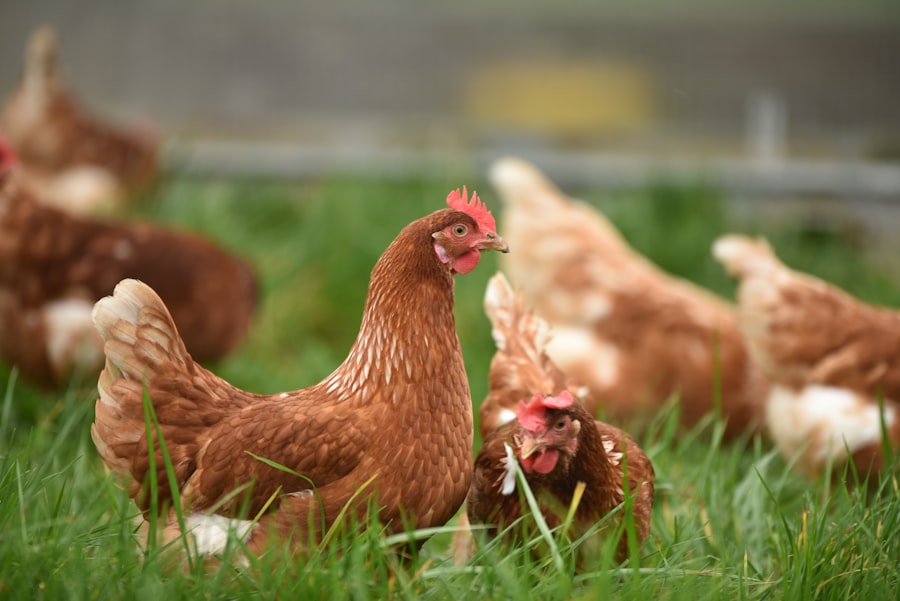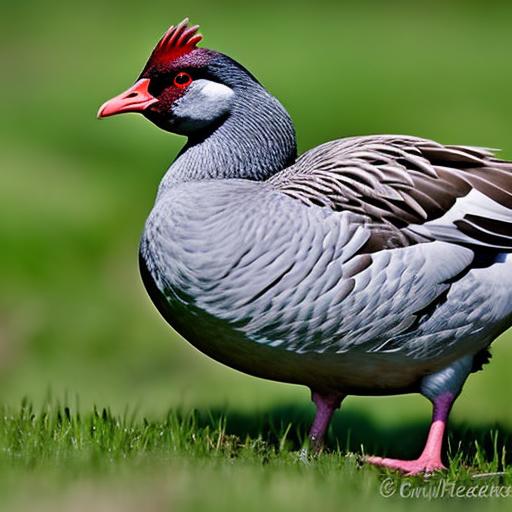Keeping geese and chickens together is a practice that has gained popularity among backyard poultry enthusiasts. It offers several benefits, such as pest control and increased egg production. However, there are also challenges to consider, such as the different needs and behaviors of geese and chickens. In this article, we will explore the topic of keeping geese and chickens together, discussing the advantages, factors to consider, and tips for designing a coop that accommodates both species.
Key Takeaways
- Keeping geese and chickens together can have many advantages, including pest control and increased egg production.
- However, it is important to consider factors such as space, temperament, and dietary needs before introducing geese to a chicken coop.
- When designing a coop for both geese and chickens, it is important to provide enough space and separate areas for each species.
- Feeding and watering geese and chickens together is possible, but it is important to monitor their intake and provide appropriate feed and water sources.
- Regular maintenance of the coop is necessary to ensure the health and safety of both geese and chickens.
Understanding Geese and Chickens
Geese are large waterfowl known for their honking calls and protective nature. They are social animals that form strong bonds with their flock mates. Geese are excellent foragers and can help control pests in the garden by eating insects and weeds. They are also good at alerting the flock to potential dangers with their loud honks.
Chickens, on the other hand, are smaller birds that are known for their ability to lay eggs. They are social animals that thrive in a flock environment. Chickens are also good at scratching the ground to find insects and other small creatures to eat. They have a pecking order within the flock, which determines their social hierarchy.
When geese and chickens are kept together, they can form a symbiotic relationship. The geese provide protection for the chickens by acting as natural guards against predators. The chickens, in turn, help control pests in the area by eating insects and weeds. They can also benefit from each other’s company, as they provide social interaction and companionship.
Advantages of Keeping Geese and Chickens Together
There are several benefits to keeping geese and chickens together. One of the main advantages is pest control. Geese are excellent foragers and can help keep the area free from insects and weeds. Chickens also contribute to pest control by eating insects and scratching the ground to expose pests.
Another advantage is increased egg production. Geese and chickens have different laying patterns, which means that you can have a constant supply of eggs throughout the year. Geese typically lay their eggs in the spring and early summer, while chickens lay eggs year-round. By keeping both species together, you can have a diverse and consistent supply of eggs.
There are also examples of successful cohabitation between geese and chickens. Many backyard poultry enthusiasts have reported positive experiences with keeping these two species together. They have observed that the geese provide protection for the chickens, while the chickens help control pests in the area. This symbiotic relationship can create a harmonious and productive environment for both species.
Factors to Consider Before Keeping Geese and Chickens Together
Before deciding to keep geese and chickens together, there are several factors to consider. One important factor is space. Geese require more space than chickens, as they are larger birds that need room to roam and graze. It is important to provide enough space for both species to move around comfortably.
Another factor to consider is temperament. Geese can be territorial and aggressive, especially during breeding season or when they feel threatened. Chickens, on the other hand, have a pecking order within the flock, which can lead to aggression among themselves. It is important to assess the temperament of both geese and chickens before introducing them to each other.
Diet is another important factor to consider. Geese have different dietary needs compared to chickens. They require more grass and greens in their diet, while chickens need a balanced diet that includes grains, protein, and calcium. It is important to provide appropriate feed for both species to ensure their nutritional needs are met.
To assess whether geese and chickens are compatible, it is recommended to introduce them gradually. Start by keeping them in separate enclosures within sight of each other. This allows them to get used to each other’s presence without direct contact. If they show signs of aggression or stress, it may be necessary to keep them separate or provide more space for each species.
Designing the Chicken Coop for Geese and Chickens
When designing a coop for geese and chickens, it is important to consider the needs of both species. The coop should provide enough space for both geese and chickens to move around comfortably. It should also have adequate ventilation to prevent the buildup of moisture and ammonia.
It is recommended to have separate nesting areas for geese and chickens. Geese prefer to nest on the ground, while chickens prefer elevated nesting boxes. By providing separate nesting areas, you can accommodate the natural nesting preferences of both species.
The coop should also have secure fencing to protect the geese and chickens from predators. Geese are excellent guards, but they can still be vulnerable to predators such as foxes or raccoons. It is important to have a sturdy fence that can keep out potential threats.
Choosing the Right Size of the Coop

The size of the coop will depend on the number of geese and chickens you plan to keep. As a general guideline, each goose requires at least 20 square feet of space, while each chicken requires 4 square feet of space. This means that if you have 2 geese and 6 chickens, you would need a coop that is at least 40 square feet in size.
It is important to provide enough space for both species to move around comfortably. Overcrowding can lead to stress and aggression among the flock. It is also important to consider future growth when determining the size of the coop. If you plan to expand your flock in the future, it is better to build a slightly larger coop from the start.
Here are some examples of coop sizes for different flock sizes:
– 2 geese and 6 chickens: 40 square feet
– 4 geese and 12 chickens: 80 square feet
– 6 geese and 18 chickens: 120 square feet
Feeding Geese and Chickens Together
When feeding geese and chickens together, it is important to consider their different dietary needs. Geese require more grass and greens in their diet, while chickens need a balanced diet that includes grains, protein, and calcium.
One way to feed them together is to provide a mixed diet that meets the nutritional needs of both species. This can include a combination of grains, greens, and protein sources such as mealworms or fish meal. It is important to provide a balanced diet to ensure the health and productivity of both geese and chickens.
It is also important to provide enough feeders and waterers for both species. Geese and chickens have different feeding behaviors, with geese preferring to graze on the ground and chickens pecking at feeders. By providing multiple feeders and waterers, you can ensure that both species have access to food and water without competition or conflicts.
Providing Water for Geese and Chickens
Water is essential for the health and well-being of both geese and chickens. It is important to provide clean and accessible water for both species.
Geese require a larger water source, such as a pond or a large tub, where they can swim and clean themselves. They also need access to fresh drinking water at all times. Chickens, on the other hand, require a smaller water source that is shallow enough for them to drink from without drowning.
It is important to keep the water clean and free from contaminants. Regularly clean the water containers and replace the water to prevent the buildup of bacteria or algae. It is also important to provide enough water containers for both geese and chickens to ensure they have access to clean water at all times.
Maintaining the Chicken Coop for Geese and Chickens
Maintaining a clean and healthy coop is essential for the well-being of geese and chickens. Regular cleaning and monitoring for signs of illness are important to prevent the spread of diseases and parasites.
Clean the coop regularly by removing soiled bedding, droppings, and any other debris. Replace the bedding with fresh material to keep the coop clean and odor-free. It is also important to regularly check for signs of illness, such as changes in behavior, loss of appetite, or abnormal droppings. If you notice any signs of illness, it is important to take appropriate measures to prevent the spread of disease.
Regularly inspect the coop for any signs of damage or wear. Repair any holes or gaps in the fencing to prevent predators from entering the coop. It is also important to provide adequate ventilation to prevent the buildup of moisture and ammonia.
Can You Keep Geese and Chickens Together?
In conclusion, keeping geese and chickens together can be a rewarding experience for backyard poultry enthusiasts. It offers several benefits, such as pest control and increased egg production. However, there are also challenges to consider, such as the different needs and behaviors of geese and chickens.
Before keeping geese and chickens together, it is important to consider factors such as space, temperament, and diet. Assessing whether geese and chickens are compatible requires careful observation and gradual introduction. Designing a coop that accommodates both species requires careful planning and consideration of their specific needs.
By providing separate nesting areas, choosing the right size of the coop, feeding them together without causing conflicts, providing clean water, and maintaining a clean and healthy coop, you can create a harmonious environment for geese and chickens.
While keeping geese and chickens together can be challenging at times, many backyard poultry enthusiasts have reported successful cohabitation between these two species. They have observed the benefits of pest control, increased egg production, and the symbiotic relationship that can develop between geese and chickens.
If you have experience keeping geese and chickens together, we encourage you to share your experiences and tips in the comments section. If you have any questions or need further information, feel free to ask. Happy poultry keeping!
If you’re considering keeping geese and chickens together, it’s important to understand the dynamics and requirements of both species. A helpful resource to explore is an article on Poultry Wizard titled “How to Care for Goslings.” This article provides valuable insights into raising and caring for goslings, which can be beneficial when integrating them with chickens. To learn more about this topic, check out the article here. Additionally, if you’re interested in enhancing your chicken coop setup, you might find the article “Heater for a Chicken Coop” or “Producer’s Pride Sentinel Chicken Coop” from Poultry Wizard’s collection of articles worth exploring.
FAQs
Can I keep geese and chickens together?
Yes, it is possible to keep geese and chickens together in the same coop or pen.
What are the benefits of keeping geese and chickens together?
Keeping geese and chickens together can provide a number of benefits, including increased protection from predators, improved socialization for both species, and reduced stress levels for the animals.
What are the potential drawbacks of keeping geese and chickens together?
There are some potential drawbacks to keeping geese and chickens together, including the risk of disease transmission between the two species, the possibility of aggression between individual birds, and the need for a larger coop or pen to accommodate both types of birds.
What should I consider before keeping geese and chickens together?
Before deciding to keep geese and chickens together, it is important to consider factors such as the size of your coop or pen, the temperament of your birds, and any potential health risks associated with mixing the two species.
How can I ensure that my geese and chickens get along?
To ensure that your geese and chickens get along, it is important to introduce them gradually and monitor their behavior closely. Providing plenty of space, food, and water can also help to reduce the risk of aggression between individual birds.
What should I feed my geese and chickens?
Geese and chickens have different dietary needs, so it is important to provide them with separate feeders and to choose appropriate feed for each species. Consult with a veterinarian or poultry expert for specific recommendations based on the age and health of your birds.
Meet Walter, the feathered-friend fanatic of Florida! Nestled in the sunshine state, Walter struts through life with his feathered companions, clucking his way to happiness. With a coop that’s fancier than a five-star hotel, he’s the Don Juan of the chicken world. When he’s not teaching his hens to do the cha-cha, you’ll find him in a heated debate with his prized rooster, Sir Clucks-a-Lot. Walter’s poultry passion is no yolk; he’s the sunny-side-up guy you never knew you needed in your flock of friends!







